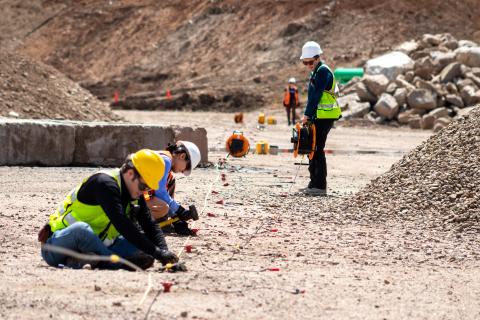All Categories
Featured
Table of Contents
What Can I Do With A Major In Geophysics? in Dalkeith Aus 2023
The primary design for the radial structure of the interior of the Earth is the initial referral Earth design (PREM). Some parts of this design have actually been upgraded by current findings in mineral physics (see post-perovskite) and supplemented by seismic tomography. The mantle is mainly composed of silicates, and the limits between layers of the mantle follow stage shifts.

This makes plate tectonics possible. Schematic of Earth's magnetosphere. The solar wind Circulations from left to. If a world's magnetic field is strong enough, its interaction with the solar wind forms a magnetosphere. Early area probes drawn up the gross measurements of the Earth's magnetic field, which extends about 10 Earth radii towards the Sun.
Inside the magnetosphere, there are relatively thick regions of solar wind particles called the Van Allen radiation belts. Geophysical measurements are usually at a specific time and location. Precise measurements of position, in addition to earth deformation and gravity, are the province of geodesy. While geodesy and geophysics are different fields, the 2 are so carefully linked that numerous clinical companies such as the American Geophysical Union, the Canadian Geophysical Union and the International Union of Geodesy and Geophysics include both.
Geophysics, Engineering Geophysics And Applied ... in Coogee Oz 2023
A three-dimensional position is computed utilizing messages from four or more visible satellites and described the 1980 Geodetic Referral System. An alternative, optical astronomy, integrates astronomical coordinates and the regional gravity vector to get geodetic coordinates. This method only provides the position in two coordinates and is more tough to utilize than GPS.
Gravity measurements ended up being part of geodesy since they were needed to associated measurements at the surface of the Earth to the reference coordinate system.
Water level can likewise be measured by satellites utilizing radar altimetry, adding to a more accurate geoid. In 2002, NASA released the Gravity Recovery and Climate Experiment (GRACE), in which 2 twin satellites map variations in Earth's gravity field by making measurements of the range in between the two satellites using GPS and a microwave ranging system. , which are studied through geophysics and area physics.
Uses For Geophysical Data in Mount Hawthorn Western Australia 2022

Because geophysics is worried about the shape of the Earth, and by extension the mapping of features around and in the planet, geophysical measurements consist of high precision GPS measurements. These measurements are processed to increase their precision through differential GPS processing. Once the geophysical measurements have been processed and inverted, the analyzed outcomes are plotted using GIS.
Numerous geophysics business have actually created in-house geophysics programs that pre-date Arc, GIS and Geo, Soft in order to satisfy the visualization requirements of a geophysical dataset. Exploration geophysics is applied geophysics that often uses remote noticing platforms such as; satellites, airplane, ships, boats, rovers, drones, borehole picking up equipment, and seismic receivers.
Aeromagnetic information (airplane collected magnetic information) collected using conventional fixed-wing aircraft platforms should be remedied for electro-magnetic eddy currents that are produced as the airplane moves through Earth's electromagnetic field. There are also corrections associated with changes in measured possible field intensity as the Earth rotates, as the Earth orbits the Sun, and as the moon orbits the Earth.
Geophysicists: Salary, Career Path, Job Outlook, Education ... in The Vines Australia 2022
Signal processing includes the correction of time-series data for undesirable sound or errors presented by the measurement platform, such as aircraft vibrations in gravity information. It also includes the decrease of sources of sound, such as diurnal corrections in magnetic data. In seismic information, electromagnetic data, and gravity data, processing continues after error corrections to include computational geophysics which lead to the final interpretation of the geophysical information into a geological interpretation of the geophysical measurements Geophysics became a separate discipline just in the 19th century, from the intersection of physical location, geology, astronomy, meteorology, and physics.
The magnetic compass existed in China back as far as the fourth century BC. It was not up until good steel needles could be forged that compasses were utilized for navigation at sea; before that, they might not maintain their magnetism long enough to be useful.
By looking at which of eight toads had the ball, one could determine the direction of the earthquake. It was 1571 years before the very first design for a seismoscope was published in Europe, by Jean de la Hautefeuille. It was never built. One of the publications that marked the beginning of modern-day science was William Gilbert's (1600 ), a report of a series of meticulous experiments in magnetism.
Geophysical Survey Flashcards in Balga Aus 2020
Geochemistry, Geophysics, Geosystems. National Aeronautics and Area Administration. Recovered 13 November 2018.
Runcorn, S.K, (editor-in-chief), 1967, International dictionary of geophysics:. Pergamon, Oxford, 2 volumes, 1,728 pp., 730 fig Geophysics, 1970, Encyclopaedia Britannica, Vol. Introduction to seismology (Second ed.).
Latest Posts
Geophysical Survey In Archaeology in Neerabup Australia 2022
Geophysicists in Glen Forrest WA 2020
Geophysical Survey in Lockridge Oz 2023